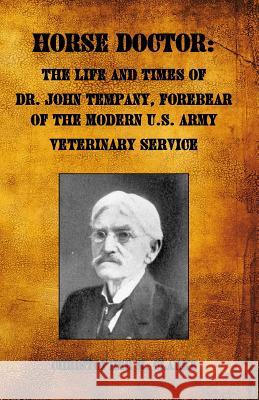Horse Doctor: The Life and Times of Dr. John Tempany, Forebear of the Modern U.S. Army Veterinary Service » książka
Horse Doctor: The Life and Times of Dr. John Tempany, Forebear of the Modern U.S. Army Veterinary Service
ISBN-13: 9781532708138 / Angielski / Miękka / 2016 / 636 str.
Horse Doctor: The Life and Times of Dr. John Tempany, Forebear of the Modern U.S. Army Veterinary Service
ISBN-13: 9781532708138 / Angielski / Miękka / 2016 / 636 str.
(netto: 99,33 VAT: 5%)
Najniższa cena z 30 dni: 103,45
ok. 16-18 dni roboczych.
Darmowa dostawa!
The life of "Dr." John Tempany spanned some of the most exciting and momentous decades of American history. Born in New York City in 1838, he became a "dragoon" (mounted soldier) and pioneer in the newly opened Pacific Northwest, helping build and settle Walla Walla, Washington. He went on to serve as an aide-de-camp to several of the most important Union generals of the Civil War and to participate in some of the greatest battles of that epic conflict. After a brief hiatus in military service, he returned to the U.S. Army as the first veterinarian assigned to full-time care of horses for the cavalry. Tempany-who earned the honorary title, doctor, though he never had any professional education as a veterinarian-served in the South during Reconstruction, then transferred with Custer's 7th Cavalry to the Southwest where he was involved in the lengthy wars against the Comanche, Apache, and other hostile Indians. He took charge of the massive wagon train and herd of animals on the famous 1874 Black Hills expedition and participated in the U.S.-Canadian Boundary survey. He likely avoided death with Custer at Little Big Horn only because he left the Army for several years to try civilian life in Minnesota. Tempany returned to his first love-the U.S. Cavalry-in 1879, serving for more than two decades with the famed all-black "Buffalo Soldiers" of the 9th Cavalry all across the West, witnessing the end of Indian hostilities and the coming of the "modern" pre-World War I cavalry. By the time of the Spanish-American War in 1898, Tempany was the Army's senior veterinary surgeon and was sent to Tampa, Florida to inspect and oversee the shipment of all the "equine soldiers" being sent off to that conflict in Cuba. During his long career, he visited dozens, perhaps hundreds, of military installations, examined and purchased thousands of horses and mules, and cared for thousands more. He was a pioneer in the nascent field of veterinary medicine in the U.S. Despite his decades of service, due to quirks in the law, Tempany (like all Army veterinarians) was neither accorded the status nor the perquisites of a commissioned officer. Veterinarians occupied an anomalous position as semi-civilians with no retirement program, disability insurance, promotions, or pay raises. In fact, his pay did not change from 1879 until 1899. Beginning in the 1890s, Tempany began to press for changes in the status of veterinarians, seeking a "private bill" in Congress that would allow him to retire with a pension. Some two decades went by before his continued efforts were finally rewarded with a 1911 rider to the Army's appropriation legislation that provided for an honorable retirement with benefit. By that time, Tempany was 73 years of age and had five decades of government service. He would not live to see the 1916 legislation that finally regularized the status of veterinarians as commissioned officers with a career path, promotion and pay raise opportunities, and retirement benefits, but the content of the law owed much to his decades of effort. A husband, father of nine children (of whom five survived to adulthood), noted raconteur, member of a number of social organizations, frequent official at various sporting events, and highly respected professional, Dr. Tempany should be well known. But like so many important and fascinating characters in American history, he has receded into the shadows of time. This volume attempts to recreate his life and times, and accord him the honor he is due as a soldier, pioneer, and forbear of the modern military veterinary service.
Zawartość książki może nie spełniać oczekiwań – reklamacje nie obejmują treści, która mogła nie być redakcyjnie ani merytorycznie opracowana.











